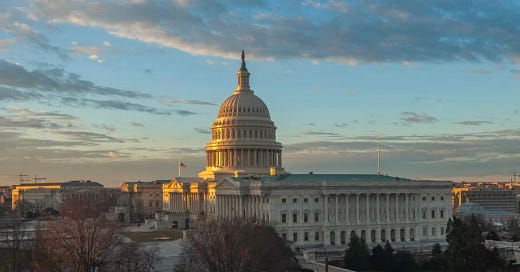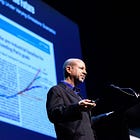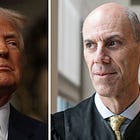“Too Busy with Woke Stuff”: The All Too (In)Visible and Inconsequential ERLC
Absent and ineffective at best, counterproductive and Woke at worst: conservative D.C. insiders share their opinion on the Southern Baptist Convention's Ethics and Religious Liberty Commission.
This analysis is free, but with Premium Membership you get MORE. Join today.
by Megan Basham
April 6, 2025
In 1993, the Ethics and Religious Liberty Commission (or as it was then known, the Christian Life Commission) helped engineer a piece of legislation that had not only Southern Baptists, but religious Americans of all stripes, cheering.
The organizations that worked to pass the Religious Freedom Restoration Act (RFRA), which broadened protections for religious exercise, were a motley crew that ranged from staunch conservatives like the Christian Legal Society and Home School Legal Defense Association to well-known liberals like the ACLU and People for the American Way, the group founded by left-wing Hollywood icon, Norman Lear.
For more than two years, this diverse coalition met monthly at the ACLU’s offices on Capitol Hill. There, they devised a statute that would bar the government from forcing individuals, ministries, and businesses to violate their sincerely-held religious beliefs. The beliefs could not be violated unless the government could demonstrate it had a “compelling interest” and ensure that any regulation employed the “least restrictive means” of achieving that interest. In other words, it was meant to restore the free exercise standard that had been lost with the 1990 Supreme Court case, Employment Division v. Smith.
As they met, the lawyers and lobbyists floated proposed language for the statute, then discussed and debated what the potential unintended consequences of that language might be. This was a particularly tricky negotiation, given that the different players had different ideas about what would qualify as harmful application. Southern Baptist representatives, for example, wanted to ensure that a right to abortion could not be claimed under the mantle of religious freedom. Meanwhile, the ACLU, whose interest in the bill was guaranteeing that Native Americans could legally take peyote during ceremonies, feared it could allow religious freedom rights to trump the anti-discrimination protections claimed by the LGBTQ movement.
Eventually, a consensus was reached, and the bill was introduced to Congress, where it passed with overwhelming bipartisan support.
In the years since President Bill Clinton signed RFRA into law, it has been a crucial statute protecting American Christians, cited by SCOTUS in rulings that safeguarded Hobby Lobby’s right not to provide abortifacients to employees (2014) and a Catholic foster care agency’s right not to place children with same-sex couples (2021). (Apparently, the conservative strategists outwitted the ACLU on that point.)
The reason the ERLC was in the room where RFRA happened was because Mike Whitehead, then the ERLC’s general counsel, had deep relationships with DC insiders who had long worked on religious liberty legislation. After he signed the law, Clinton sent Whitehead a personal note, thanking him for his work crafting the measure and offering prayers for Whitehead’s teenage son, who was battling leukemia at the time.
“Our involvement in that litigation was probably the first major involvement by Southern Baptists in legislative drafting,” Whitehead told me. And because he stopped representing the ERLC two years later, it was also one of their last.
Invisible and Ineffective
Today, Whitehead sits on the board of the Alliance Defending Freedom, the conservative legal advocacy group that continues to be heavily involved in drafting federal- and state-level legislation on religious liberty, the sanctity of life, and marriage and family. When he talks to friends in the Capitol about what role, if any, the ERLC is playing in supporting policies in these areas, he’s told they’re invisible. “They’ll offer comments to the press, then they’ll write that they are involved, and they’ll take credit when an issue they’re supporting prevails. But they really are not viewed as being actively helpful on advancing conservative politics on the Hill,” he said.
The 19 lawmakers and Hill staffers I contacted for this essay all echoed that assessment.
Few senators have become as identified with their work on social issues as Mike Lee of Utah. He sponsored 2015’s First Amendment Defense Act, which would have shielded individuals and organizations from federal penalties for believing in the biblical definition of marriage. He backed RFRA’s application in cases like Little Sisters of the Poor v. Pennsylvania (2020), which guaranteed Catholic organizations couldn’t be compelled to include contraception coverage in their health insurance plans. For years, Lee’s been at the forefront of the pro-life fight in Congress, trying to force a Senate vote on ending federal funding of Planned Parenthood and other abortion providers. In 2022, he was a principal opponent of the misnamed Respect for Marriage Act (RFMA) that enshrined gay marriage into law. Put simply, Lee is a key Senate leader on the very issues for which the ERLC claims to be working with legislators.
Yet, when I asked Lee about any support his office has received from the Southern Baptists’ policy arm, he couldn’t remember ever hearing from them. “That doesn’t mean that they’re not meeting with staff,” he told me. “But the fact that I haven’t heard anything memorable about them means they’ve been completely absent on the big fights over big issues. I don’t recall them going against RFMA or Planned Parenthood funding or anything else.”
This would be the consistent refrain of my inquiry into how the ERLC is viewed on the Hill.
When it comes to DC insiders, few are more inside than Rachel Bovard. Along with turns as policy advisor for Senators Rand Paul, Tom Coburn, Joni Ernst, and Pat Toomey, she’s also served on the staffs of multiple Congressmen, always in legislative roles. In 2013, the National Journal named her one of the “Most Influential Women in Washington Under 35.” A decade later, The Hill would include her on its list of the “25 Staffers Who Make Capitol Hill Run.” Today, Bovard is Vice President of Programs at the Conservative Partnership Institute, a group New York Magazine called a “powerful networking hub” for conservatives in D.C., due to its regular congressional researcher bootcamps and legislative director retreats.
And what are her views on the effectiveness of the ERLC in advocating for policies that align with biblical principles? “In 12 years on the Hill, I don’t ever remember hearing from the ERLC,” she said. This is particularly noteworthy because, during her time as executive director of the Senate Republican Steering Committee, Bovard ran weekly meetings of conservative movement groups and staff, where priority issues and positions on legislation were discussed. “Probably 175–200 people were on the invite list,” she told me, “and meetings regularly drew 80–100 people. [The] ERLC was never there as far as I recall.” In fact, Bovard said she never thought of the ERLC because she didn’t know they existed. “Which is odd,” she continued, “because the Steering Committee’s entire job is to be an access point for the conservative movement to the Senate.”
Other Congressional staffers echoed Bovard and Lee. “They have zero effectiveness. Never once saw them at coalition meetings on the Hill or visiting our office,” said one Republican Senator’s former legislation director, who now works at a top conservative policy group. Of Tim Mackall, the ERLC’s policy associate in the Capitol, he added, “I had to go look up who their DC person would be, and I’ve never heard of this fellow.” Another policy advisor who previously worked in Marco Rubio’s office and is now on staff with a prominent Congressman said the same. A legislative director for a Texas Congressman said he recalled hearing from the ERLC once about a church parking lot tax.
Even when it comes to the senior senator from their own state of Tennessee, the ERLC’s influence appears to go unfelt—Marsha Blackburn’s media director said that in the year she’s been in her position, she does not recall interacting with the policy body of the largest Protestant denomination in the country.
Actively Counter-Productive
Worse than those who view the ERLC as invisible and hence irrelevant are those who see it as actively harmful.
If anyone could give Rachel Bovard a run for her money as the ultimate young DC insider, it would be Eric Teetsel, who spent his early professional years in the culture war trenches as the executive director of the Manhattan Declaration, trying to prevent the redefinition of marriage. He would go on to serve as Senator Josh Hawley’s chief of staff and Director of Faith Outreach for Marco Rubio’s 2016 presidential run before accepting a role as Vice President of Government Relations at the Heritage Foundation. In September, he took over the leadership of the Center for Renewing America from its founder, Russ Vought, Trump’s appointee to run the Office of Management and Budget. Unlike many sources I spoke to on the Hill, Teetsel is familiar with the ERLC. Very familiar. And that familiarity has not bred confidence.
“As a Southern Baptist who happens to be an expert in what they’re supposed to be doing, I can tell you, they’re completely and entirely worse than useless,” he told me. “They are actively counterproductive to the ends that Southern Baptists ought to expect from an entity that purports to be the public policy arm of their convention. When it comes to protecting life, family stuff — you know, the basic conservative things where all the movement groups in town would tend to align — they’ll sign coalition letters, but that’s nothing. It’s meaningless. Those agenda items are going to happen anyway, because other groups that are more influential and effective than the ERLC are driving them. The ERLC just hops on board and takes credit.”
Teetsel says the easiest thing for any policy group to do is to add their name to public letters or join amicus briefs written by others and trumpet this to their constituents as action. But the real question stakeholders should ask is what hard advocacy efforts their representatives are involved in. “You have to ask who they’re regularly talking to,” he said, with a heavy emphasis on regularly. “What events are they attending? What meetings do they host? Do they spend money on digital marketing campaigns? Are they advising on crafting measures? Are they a part of strategy sessions to get legislation passed? Is there anything that they could point to that would suggest they do something other than write letters and take photos? Because that’s all I’ve ever seen from the ERLC.”
Indeed, Teetsel says years of being led by Russell Moore, and then his former chief of staff, Brent Leatherwood, has resulted in many conservative groups viewing the ERLC with skepticism. It’s not only that they see the organization investing more energy and resources into biblically debatable issues like gun control and immigration policy than it does into those where Scripture is unequivocally clear, like marriage and abortion, they also resent the ERLC’s tendency to take victory laps for battles in which it didn’t fight. As an ERLC source who spoke on the condition of anonymity pointed out to me, today, they rarely write their own amicus briefs. Rather, their typical practice is to sign on to those drafted by other organizations.
Their Own Backyard
One defense of the ERLC’s lack of stature in the Capitol is that, compared to some of the larger faith and family policy groups, its operating on a relatively small budget. But it would be reasonable then to expect it to have a larger impact in the small pond in its own backyard of Nashville. Certainly the ERLC has crowed about their achievements in the Volunteer State when it comes to fighting gender ideology and promoting biblical values.
Tennessee state representative Chris Todd is a Southern Baptist himself. In the fall of 2022, funded by money raised by a local church, he spearheaded a lawsuit to stop drag performances in public spaces. When it was only partially successful, he set about getting a ban passed. In both fights, Todd says, he would have welcomed the ERLC’s help. But though ERLC offices are close enough to the state capitol that President Brent Leatherwood could walk over in less than 15 minutes, he never did. Said Todd, “I’ve not had anybody that I recall mentioning any assistance from that group. Not on that bill or others I’ve co-sponsored.”
Likewise, though Leatherwood told Baptist Press the ERLC supported a law to ban transgender treatments on children “as it made its way through the Tennessee legislature,” House Majority Leader William Lamberth, who was a principal architect and co-sponsor of the bill, couldn’t remember receiving that support. He did not recall any involvement from the ERLC. And while Senator Blackburn, Governor Bill Lee, and many state representatives, along with national policy advocates, spoke at a massive Nashville rally that ginned up public support for the measure, no representatives from the ERLC were among them, though the event was close enough that they surely heard the cheers and speeches from their windows.
Leatherwood was not so lethargic on a gun control bill, however. Though Tennessee Republicans ultimately blocked it, the ERLC President was a prominent voice working toward its passage, suggesting the entity will engage on state issues when sufficiently motivated.
One issue that did not find the ERLC so motivated was protecting women’s private spaces. Lamberth’s colleague, Tennessee Representative Monty Fritts, told me the ERLC was similarly MIA on a bill he sponsored to keep men out of women’s bathrooms, locker rooms, and prisons. Again, this is an issue the ERLC regularly highlights in its appeals to Southern Baptists for support. Fritts also said that while many ministries and faith groups in Tennessee backed his proposal to officially name July a month of prayer and fasting, the ERLC was not one of them.
“I thought I might get some support on that prayer measure, but I never heard from them,” Fritts said. “They don’t send me emails. They don’t call my office. But I see some of the other issues they’re involved in, so I thought maybe they were too busy with woke stuff.”
Credibility
A reputation for “woke stuff” has been an increasing problem for the ERLC. The chief of staff for one high profile GOP senator, known as a social issues bulldog, had heard of the SBC’s policy group (though he noted he’d had “no experience with them whatsoever”), but the impression he had might surprise a lot of Southern Baptists.
“Correct me if I’m wrong,” he asked me, “but I believe what I have heard about them is they care more about issues that are helpful to the other side of the aisle, right? Aren’t they a Never Trump group?”
Tami Fitzgerald, executive director of the policy nonprofit, North Carolina Values Coalition, served on the ERLC’s board from 2012 to 2019 and had a front-row seat to the entity’s shift in focus under the leadership of Moore. “We had this meeting of the executive committee, which I was on, before the convention started,” she remembered, “and Russell Moore was going through his agenda, and he had made some statements that the SBC was going to change its tone and that the culture wars were over. Instead of stuff like abortion and gay marriage, we were going to focus on issues like immigration, sexual abuse, and racial injustice.”
As someone who had long fought in those “culture wars,” Fitzgerald took offense. “I said at the meeting, ‘it is insulting to those of us who have worked in the culture wars for years and spent our lifetimes working on the culture wars to say it’s over and we’re changing the tone. Because that insinuates that the tone was wrong.’” The reaction from ERLC staff, she said, was stone cold silence. “No one said a word,” she recalled. “And then immediately after the meeting, I was surrounded by all the PhDs who were Moore’s acolytes, telling me how wrong I was. It was all insulting.”
Fitzgerald said from then on the ERLC became more distinguished for Moore’s very public opposition to Donald Trump (a position few Southern Baptists shared) than for its policy positions.
Though the sexual abuse issue has begun to fall by the wayside with admissions that the SBC’s executive committee never mishandled or covered up abuse as Moore claimed, the other, more debatable issues have remained a priority under Leatherwood, and he’s added others of his own, like gun control. He provides regular comments to legacy media outlets only too-happy to have an opportunity to highlight evangelical leadership seeming to oppose the GOP on progressive-coded issues. The ERLC continues to be heavily involved with the George Soros-funded Evangelical Immigration Table, registering opposition to President Trump’s border policies. And while not as vocally anti-Trump as Moore, Leatherwood has stirred controversy by echoing highly questionable Democratic talking points, like praising President Biden’s selflessness when his party forced him out of the presidential race.
Teetsel believes this evolution has left the ERLC without a path to influence the current administration.
“They have zero relationship with the Trump Administration,” he said, “Zero. It’s possible that Brent [Leatherwood] could be invited to some hamster-wheel fake coalition gathering of so-called leaders where people rotate in for a picture, but that’s not influence. Influence is having a relationship with key staff who drive an agenda. If you think that you’re doing something because you got your picture taken on the speaker’s balcony or in the East Room, you’re fake. That’s called grift.” Real influence, in Teetsel’s long experience, is knowing the people down the chain, the deputy assistant secretaries and others who drive agendas. An effective policy advocate, he told me, already has them in his rolodex and is able to invite them for coffee at a moment’s notice in order to seize fleeting opportunities to push an agenda forward.
Asked for an example, Teetsel offered one immediately. “My friend is a professional political operative, and he was recently given a policy idea. He wrote an op-ed about it. Then my friend sent it to the one person in the White House who needed to see it. He loved it. He drafted an executive order based off of it and showed it to the President, who loved it. So President Trump just signed that order, and it took my friend a week to get it done, because he knew the right people and the policy like the back of his hands. That’s what an operative can do. The ERLC could not do that in a million years, because they don’t have the experience and they don’t have the credibility in the context.”
Meaningful Representation
Given its lack of presence and connection in DC, how then does the SBC’s policy arm manage to convince Southern Baptists that their tithe money is being well invested in the ERLC? Largely because, while not an effective policy shop, it is an increasingly effective PR shop.
Just this week, on March 25, following rising chatter about its lack of relationships at the White House or on the Hill, the ERLC and its representatives posted a flurry of photos of a DC meeting it hosted. “A group of pastors joined us today for insightful discussions with [Senator Ted Cruz], [Senator James Lankford], and [Congressman Kevin Hern] about the vital role our faith plays in shaping policy, and how Southern Baptist voices can make a difference in our nation’s Capitol,” one post said.
What was notably absent from the social media posturing was insight into the actual agenda of the meeting. How long did it run? What policies were discussed? What commitments did the ERLC make toward advancing them? What commitments did it extract from the lawmakers? Had they planned any follow-up interaction or strategy sessions, or was this merely a shiny photo-op, a hastily-arranged field trip to burnish public image? History (and the lack of substance in the ERLC’s promotion of this meeting) suggests the latter. When I pointed the posts out to Teetsel, he was unimpressed. “Photos like those are about as meaningful politically as the groups of schoolchildren who periodically visited our offices,” he said. “Maybe less so, as the kids are constituents.”
To Teetsel’s point, I asked Senator Cruz’s office about the meeting ERLC reps have been so prominently featuring on X. I was told it was “brief and general,” and Cruz’s spokesperson did not recall his office having any previous meetings or interaction with the ERLC before this week.
Still, given how common it is for advocacy groups to avail themselves of this kind of meet-and-greet publicity, it’s fair to ask why the ERLC has so rarely done so until recently. As Jim Pfaff, president of The Conservative Caucus and lobbying veteran with decades of experience in DC observed, meetings with members of Congress on Capitol Hill are usually handshaking affairs when grassroots organizations bring in groups of people associated with them. “When I worked on the Hill, this was quite common,” he said. “There will be some light policy discussion about general topics and concerns, and occasionally there is a big issue or bill looming. But it’s mostly for the purpose of making Members aware a group has grassroots backing.”
But Pfaff doesn’t believe this was the motivation for the ERLC’s recent social media blitz. “In the case of ERLC, I’m convinced Leatherwood is using the standard model to create a facade of relevancy. Ever since Russell Moore was at the helm, conservative Baptists have gotten the message that ERLC doesn’t represent their views particularly on social issues. Brent Leatherwood is able to gather some pastors and show up. And Members will meet with them because they believe they are courting a relationship with millions of Southern Baptists. I look at it the other way around. I’m convinced Brent Leatherwood is using this to beef up his bona fides with conservative SBC people who, not knowing better, will be impressed to see Leatherwood with someone for whom they have great respect: Sen. Ted Cruz, et. al.”
At the 2024 convention, a vote to abolish the ERLC drew 40 percent support, by some estimates, and there are expectations that calls for reform or eradication will come again at this year’s national meeting. As criticism of the ERLC’s performance has grown, its PR efforts have ramped up considerably, with SBC pastors reporting a marked increase in communications from the entity. This makes sense given that, of three new recent hires, two were communications roles and none are based in the DC metro. What the pastors receiving the fresh flood of communications likely don’t know is that policy veterans say the ERLC would have been much better off investing its resources in serious players who live in the Capitol.
To really be effective in policy advocacy, the ERLC would have to change its approach significantly. Because many pastors understandably aren’t familiar with the finer details of how legislative sausage gets made, when they hear that the head of the ERLC’s DC office reads all the bills coming out of Congress, they’re likely to be impressed by such dedication. But the reaction of someone with expertise in the field is that this is a sign of an inexperienced person who doesn’t realize he’s wasting time. To be effective means being involved in the coalitions and meetings where the bills are being drafted, not reading them later, when it is too late to meaningfully shape the language. It means having daily, in-person strategy meetings with Hill staffers whose faces aren’t immediately recognizable, so photos with them won’t rack up social media likes. But they are the people one must have close relationships with if one hopes to get things done. Open letters are a dime a million in politics, and every Hill staffer will tell you dozens go in their trash daily.
And it’s not just in recent hires that the ERLC appears more focused on PR than policy. One chief of staff for a red state senator noted that the ERLC doesn’t seem to hire many people with strong policy backgrounds of any kind. “That seems a little odd for a policy advocacy organization,” he said.
Teetsel was more blunt. “They think having a couple of 25-year-olds in an office on the Hill is representation in DC,” he said. “Now the 25-year-olds may be nice, but 25-year-olds do not advance policy agendas. That’s not how this works. And Brent [Leatherwood] has zero DC experience whatsoever, and lives in Tennessee. So if you’re not here full time, and you don’t have a pre-existing network of contacts and credibility, and you’re relying on 20-somethings who’ve been on the Hill for a year to advance your agenda, you’re fake. That’s a fake organization.”
The question is, what would meaningful policy advocacy from the ERLC look like beyond press releases and media statements? Tom McClusky, director of government affairs at the political advocacy group Catholic Vote is especially qualified to answer that question, given that he was included in The Hill’s list of most influential grassroots lobbyists of 2024.
For him, it starts with daily meetings with senators, congressional members, and their staffers whenever Congress is in session and using sticks and carrots to convince the politicos to move on agenda items important to Catholics. “There’s two types of lobbying,” he told me. “There’s lobbying like Exxon does, where they pay a campaign $5 million and they get a meeting with the congressman. And then there’s nonprofits like March for Life, Family Research Council, and our organization, where you have a constituency. And either because the congressman or senator respects you or fears you and what you might do with that constituency, they respond very quickly. But they need to know you have a record of being able to activate those constituents, those grassroots.”
The problem for the ERLC is that it often takes positions many of its constituents oppose, as in the cases of immigration, gun control, and racial issues. By throwing Southern Baptist influence behind positions that go beyond the limits of resolutions that SBC messengers have approved, something more akin to the Pope handing down ex cathedra statements than acting as representatives, Leatherwood (and Moore before him) have squandered the power of an aligned constituency. There is no reason for anyone in the Capitol to fear or welcome the ERLC’s ability to mobilize a base from which it has alienated itself.
When I asked David Keller, chief of staff for Senator Jim Banks, about the ideal qualities of policy allies, he immediately cited the American Principles Project (APP). President Terry Schilling, he told me, is someone who is deeply engaged and doesn’t shy away from his group’s mission to engage aggressively on so-called culture wars issues related to life and the family. And he’s been able to effect change that elected officials can’t achieve on their own.
“On Capitol Hill, if taxes are too high, we can cut them,” Keller said. “If there are too many regulations, we can roll them back. But, if we lose our culture, which was built on Christian values, we aren’t getting it back. Groups like APP provide resources, ideas and policy objectives and work with offices across the hill to amplify messaging to people who care and are motivated to act. They really see the mission and set the tone.
Conclusion
If Southern Baptists are to have a policy arm, it should be one where its presence and influence have consequence among our nation’s leaders. Whether seen as partners or opponents, they should know that the ERLC is a force to be reckoned with.
Ironically, while the ERLC congratulates itself with destination photo ops in the nation’s capitol, the impact of this meeting as told by the negative assessment of Southern Baptists online, as well as the estimations of pastors in their churches, tells another story. And for those in Washington, D.C. who have either ignored or avoided the ERLC, all that such visibility campaigns do is solidify the opinion that, despite representing the largest Protestant denomination in America, the ERLC is too busy with woke stuff to help conservative policy efforts and too out of step with its own constituents to have any real political significance.
There is a great difference between political advocacy that is effective and often unseen because it is done without cameras and PR campaigns, and making trips to Washington, D.C. where the meetings are visible but largely inconsequential.
Truly, if the Southern Baptist Convention is going to have the kind of impact in Washington that it did in the days of Mike Whitehead, then the ERLC must show it is more dedicated to its mission than its image and it must make sure that mission represents a consensus of Southern Baptist views.
— This article was originally published at Christ Over All and is used here with permission. Megan Basham is the bestselling author of Shepherds for Sale: How Evangelical Leaders Traded the Truth for a Leftist Agenda.










